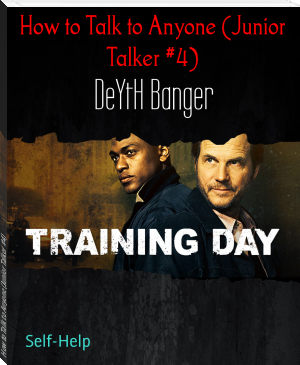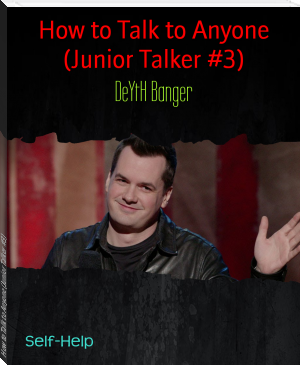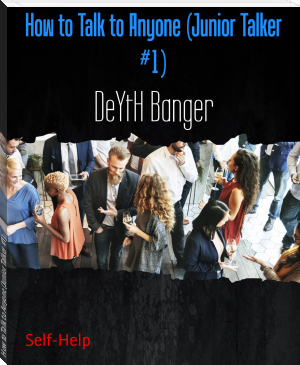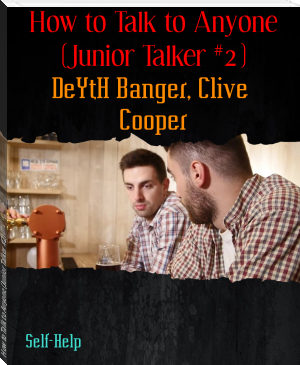How to Talk to Anyone (Junior Talker #4) by DeYtH Banger (novels in english TXT) 📕

- Author: DeYtH Banger
Book online «How to Talk to Anyone (Junior Talker #4) by DeYtH Banger (novels in english TXT) 📕». Author DeYtH Banger
When I committed the indecent exposure, I was only two weeks out of prison. And, honestly, part of me just felt, "please put me back in". There was an element of trying to shock people, too. I wanted to be noticed. I was trying to get attention. It was a bad way to go about it obviously. But my whole attitude to intimacy, to relationships, wasn’t normal.
As soon as I was released the last time, I made contact with Circles, a treatment program for sex offenders returning to the community. I was told: "If you’ve got any issues, if you’re thinking of reoffending, you can ring these people up and talk to them."
AT A GLANCE
Sex offender treatment programmesDr Jackie Craissati, Clinical Director and Head of Forensic Psychology at Oxleas NHS Foundation Trust
The majority of sex offenders leave prison and we need to make sure the community is safe when they do. Sex offender treatment programs (SOTPs) halve the reconviction rate among high risk sex offenders. The following programs are available in UK prisons:
Core SOTP: Focusses on the decisions which led to the offences, and their impact on othersExtended SOTP: For higher risk offenders.
Examines how the path to offending developed, in the context of deeper personal problemsBooster: Guidance on managing or avoiding risky situations in future.
Taken after Core or ExtendedAnti-libidinal medication, or “chemical castration”: Now being trialled at Europe’s biggest sex offender prison, HMP Whatton in Nottinghamshire. Research suggests very low reoffending ratesOffenders won’t get treatment if:They deny their offencesbecause they have to be prepared to talk about itTheir sentence is less than 3 yearsThey’ll generally serve 18 months, of which 12 will be spent on a waiting list, leaving insufficient time to complete treatment, which lasts around 9 months
They’re all volunteers at Circles. They’re given special training, but they’re just ordinary people. To be honest, I wondered why on earth people would volunteer to do this. But they've made me realise there are people out there who want to help. And that makes me feel better, because sex offending is very stigmatised, obviously. It's a very difficult thing to open up to people about.
I saw them weekly for the first few months. And pretty much every time, I went home feeling I’d been enlightened in some way. They challenged my thinking.
For example, I met my last girlfriend when she was in rehab for drug and alcohol abuse. When I told them about our relationship, they said, “Oh, that’s nice. She’s probably a bit vulnerable, isn’t she? She’s been in rehab. And you’re a bit vulnerable, rebuilding your life right now.” It made me stop and think, “what am I doing? Am I taking advantage?” It’s things like that.
They also made me ask myself why I was thinking about sex all the time. I constantly have to work at that, at shifting my mind on to other things. It isn’t healthy. But - maybe it´s just getting older - I think I’m finally growing out of it.
Also, I avoid certain things. I only watch news and documentaries on TV. There’s too much sex in other programs and it was beginning to drive me mad. And I avoid pornography. I was saturated with the stuff as a kid, it was too much. Now I don’t watch it at all.
It’s also important for me to avoid stress. If things get stressful I have to work especially hard to think about something other than sex and offending. I don’t want to be thinking about that. It’s taken me a long time to break out of those patterns.
Circles has helped me tremendously. I think if I hadn’t had them I’d be back in prison again, for the same crimes, because I wouldn’t have dealt with my problems. I still meet them whenever I need to - about once a month. It makes me feel stronger knowing I have someone I can check in with and talk to instead of just going mad at home. It’s important to me to have that.
I decided to tell my last partner about my offences. Bloody hell, I was nervous. It was like dropping a bombshell. I said, “I need to tell you something.” She let me talk and then she said, “Thank you for telling me.” I think she was shocked, but she dealt with it really well, much better than I expected. We talked about it. But we’re not together anymore.
I’ve thought about getting in touch with my ex-partner, my victim, but I think it would probably be damaging for her. I did remain in contact with her for a long time after I was in jail and I think we said all we had to say. I got to tell her I was sorry.
The thing that stops me from reoffending now is that I don’t want to be that person that hurts people anymore. I’ve done a lot of hurting people, and it doesn’t feel good. I’m a different person now.
*not his real name
Why Do Men Rape?
Note: I enjoy misery of others
...
And when you feel bored:
"A decent girl won't roam around at nine o'clock at night. A girl is far more responsible for rape than a boy," - A Rapist
A 14-year-old girl and her mother are raped by a group of eight men for three hours; a 16-year-old gang-rape victim sets herself on fire in Morocco after the rapists threatened to publish photographs of the ordeal; a 20-year-old girl is gang-raped in Haryana by the same five men who had raped her three years ago and were out on bail...I could go on and on about the rape cases that have made headlines in the past six months alone; and research shows 67-84% of rape cases are never even reported.
The rape of women by men has occurred throughout recorded history and across cultures. In India, brutal rapes and gang-rapes have become daily news. Each time we feel things cannot get any worse, men across this country, as if taking that up as a challenge, shock us with another brutal incident.
While we get angry, join protests, and demand that rapists be hanged to effectively fight this age-old evil, we need to spend more time understanding it so that we can fight the cause and not the symptom.
So why do men or groups of men rape?
1) Because they can
In a study done in South Africa, when rapists were asked about motivations, men indicated that rape most commonly stemmed from a sense of sexual entitlement. Professor Jacqueline Bhabha says, "Once the sense that women are less important in some way is endemic and accepted, as it is, once large sections of Indian society accept that women are there to service men, that men are justified in hitting their wives, then pervasive gender violence comes as no great surprise."
2) Because she deserves it
A 2012 report by UNICEF found that 57% of Indian boys and 53% of girls between the ages of 15 and 19 think wife-beating is justified. A recent national family-health survey also reported that a sizable percentage of women blame themselves for beatings by their husbands. And if violence is okay, then what's to stop them from sexual violence?
A research also showed that rape is often seen as a punishment directed against other women.
3) They were just having fun
In the South African study, after interviewing thousands of convicted rapists it was found that it was often an act of bored men (alone or in groups) seeking entertainment. At home, our leaders and top officials have time and again made rape sound like nothing more than a game. Take a look for yourself:
Ranjit Sinha, head of Central Bureau of Investigation(CBI): “If you can’t prevent rape, enjoy it.”
Om Prakash Chautala, former chief minister, Haryana: “Girls should be married at the age of 16, so that they have their husbands for their sexual needs, and they don’t need to go elsewhere. This way rapes will not occur.”
4) Because they will get away with it
Three words - police reforms, police reforms, police reforms! The Justice Verma committee, formed after the Nirbhaya rape case, had highlighted the police and judiciary reforms that are desperately needed in the country in order to prevent and deal with rape cases. None of these have been implemented.
The rapist is highly likely to get away with his crime. Even if he is caught, India's court system is painfully slow, in part because of a shortage of judges. A Delhi high court judge once estimated it would take 466 years to get through the backlog in the capital alone.
5) One of them start it, the rest just follow
Psychologist David Lisak, an expert in violent crimes says,"Groups of individuals can be far more positive or far more negative, that’s the nature of group dynamics. If you have a group of men, all of whom have various levels of frustration in their lives, and who feel powerless and angry for the things that are not going well in their lives — if you have one person in that group who begins to provide the group with an outlet and a target, then that can lead to violence. If they’re in a culture where there are a lot of messages about the entitled role of men, the culture can provide some very ready scripts for violence."
6) Because they are men, real men
Sociologist Beth Quinn argues that other men are often the intended audience and that harassment has much more to do with keeping women in their place than with sexual attraction. Logically, gang rape is explained more by men’s “need” to perform gender control for other men than it is explained by any kind of “irresistible” sexual desire. The psychology of gang rape is aided by numbers, by underlying aggression, anger, and misogyny, by “cult of masculinity”.
7) Because physically brutalising her makes men feel better about themselves
Psychologist David Lisak says, "There is nothing new about human beings targeting a vulnerable group. Not so long ago it happened in Nazi Germany where Jewish groups were targeted by an angry population. Rape is a particular form of violence."
If a culture provides a lot of messages like - “If you’re a successful man, women will fall all over you” - men that grow up there may feel emasculated, or angry, when that doesn’t happen. Hence violating another person makes them feel better about themselves. What is needed to address this problem is a wide range of systemic and far-reaching measures. Just wreaking vengeance by issuing death penalties is not the solution. It satisfies a lust for biblical retaliation without opening up a space for much-needed rational, national soul-searching.
Chapter 18 - Rape Method (Part 3)
Note: Don't over do happiness....
...
Rape-Method
...
Rape-Method is the method when everything which knows... sounds like a knowledge of total rapist....
P.S.: I call this brag out bitch
Won’t Someone Think of the Rapists?
Being interviewed for The Evening Standard self-confessed rapist Tom Stranger, who shot to fame when sharing a stage with the woman he raped for a T.E.D talk said, “In South of Forgiveness we speak about the ‘monster myth’ and how rape is seen as an inhuman act. I see it as part of a specific problem. It’s almost like escapism.”
I find myself constantly returning to Tom Stranger and Elva Thordis’s talk and interviews (I have not





Comments (0)